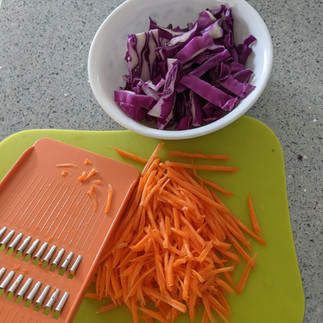A 10-minute Quick Recipe for Cabbage Bibimbap Using leftover Rice and Veggies
- Bright Wisdom
- Aug 17, 2023
- 2 min read
Hello food enthusiasts! Today, I'm excited to share with you a delightful and time-saving recipe that's perfect for those moments when you find yourself with leftover rice and a medley of vegetables in your fridge.
We all know the struggle of cooking just the right amount of rice, often resulting in those tempting leftovers. Fear not, because I've got you covered with a scrumptious solution!
*The Leftover Rice Hack
Cooking the perfect quantity of rice can be a challenge. To tackle this, I've adopted a smart strategy that saves time and minimizes waste. I prepare a generous batch of rice in one go and portion it into small containers for the freezer. This way, a delicious bowl of rice is just a thaw away whenever the craving strikes.
Cabbage Bibimbap: A Flavorful Quick Fix
Bibimbap, a popular Korean dish known for its vibrant flavors and wholesome ingredients, takes a creative twist with this 10-minute recipe. The star of our show? Cabbage! This versatile vegetable serves as the base for our bibimbap, providing a refreshing crunch and a hearty foundation.

Today, I am actually using cabbage and carrots because that's what I have in my fridge.
However, feel free to add whatever you like, such as onions, capsicums, and zucchinis, etc.
For an added protein boost, I am including an egg as well.
Why it's so easy to make?
Because you can use the reheat function on the rice cooker, eliminating the need to fry them with oil, etc. In fact, for this reason, the dish is light and even healthier.
Simply add the rice with the chopped cabbage and carrots to the rice cooker and start the reheating process. While it's reheating, you can prepare the egg if you'd like to add it.
If the rice is frozen and requires a bit more time, you can reheat it once again.
When it's done, simply mix everything and add the egg. Then, drizzle a little bit of the magic soy sauce to season it to your liking, or you can also use Gochujang sauce as an alternative.
That's it. So simple!
Cabbage?
I'd also like to take a moment to discuss the benefits of cabbage. This humble vegetable boasts an array of health advantages that you'll definitely want to know about!
Cabbage is a low-calorie vegetable that offers numerous health benefits.
It's rich in vitamin C, which supports the immune system and aids the body in absorbing iron. Additionally, cabbage contains vitamin K, a vital nutrient for blood clotting and bone health. This vegetable is also an excellent source of fiber, promoting digestion and preventing constipation.
Furthermore, cabbage's antioxidants and phytochemicals give it potent anti-inflammatory properties. These compounds may provide protection against chronic diseases like heart disease, cancer, and arthritis. Given all these benefits, it's clear that cabbage is a healthful addition to your diet. You can enjoy it in a variety of dishes, from salads and soups to various fermented products.
I hope this simple 10-minute Quick Recipe for Cabbage Bibimbap helps you utilize leftover vegetables in your fridge while enjoying healthy and delicious food!
Please take a moment to enjoy the recipe in this quick 30-second video!





























Thanks for the Cabbage tips Robin. I've started to eat more cabbage from reading your posts